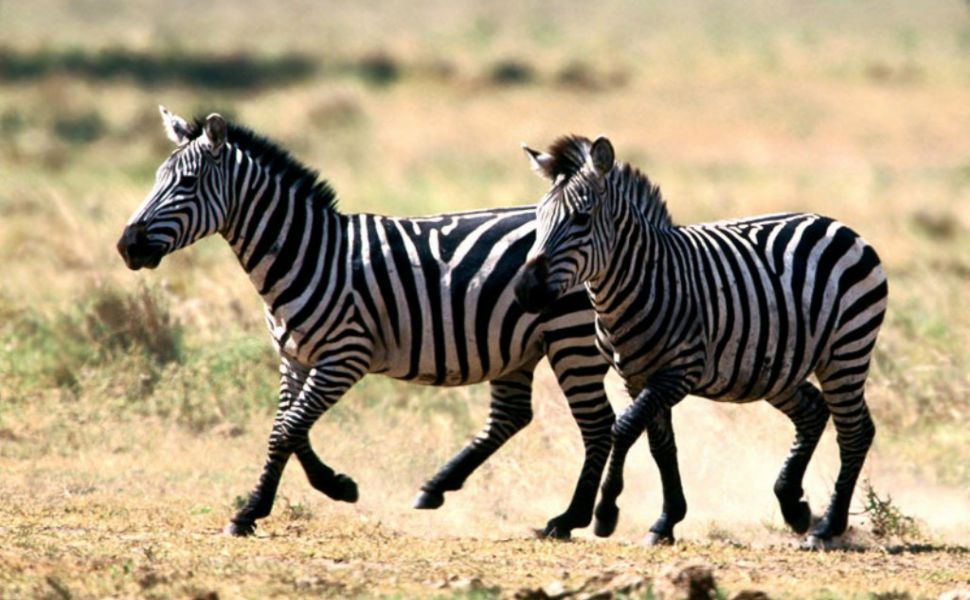Have you ever wondered what sound do zebras make? We've all seen them in zoos or on nature shows, but their vocal talents often go unnoticed. Believe it or not, zebras have a whole range of sounds that help them communicate with each other in the wild. From braying like donkeys to barking like dogs, these striped beauties have a unique language all their own.
When most people think about zebras, they picture those iconic black-and-white stripes and maybe a few fun facts about their grazing habits. But did you know that zebras are actually quite the chatterboxes? Their sounds play a crucial role in their social lives and survival strategies. In this article, we'll dive deep into the world of zebra vocalizations and uncover the secrets behind their unique voices.
So, if you've ever found yourself asking, "What sound do zebras make?" you're in the right place. We'll explore everything from their braying calls to their subtle snorts, and explain why these sounds matter in the wild. Let's get started!
Read also:Arikytsya Of Leaks The Untold Story Youve Been Missing
Table of Contents
- Zebra Basics: Understanding These Striped Animals
- Main Sounds Zebras Make
- Why Do Zebras Make Sounds?
- How Zebras Use Sound for Communication
- The Connection Between Sounds and Behavior
- Different Zebra Species and Their Sounds
- Comparing Zebra Sounds to Other Animals
- Scientific Studies on Zebra Vocalizations
- Interesting Facts About Zebra Sounds
- Conclusion: The Importance of Understanding Zebra Sounds
Zebra Basics: Understanding These Striped Animals
Before we dive into the sounds zebras make, let's take a moment to appreciate these amazing creatures. Zebras are part of the equine family, which also includes horses and donkeys. They're native to Africa and are known for their striking black-and-white stripes, which serve as both camouflage and a way to confuse predators. But there's so much more to zebras than just their looks.
What Makes Zebras Unique?
Zebras are social animals that live in herds, and their communication skills are top-notch. While their stripes might be their most famous feature, their vocal abilities are just as impressive. These animals rely on sound to stay connected, warn each other of danger, and express emotions. So, what sound do zebras make exactly?
Main Sounds Zebras Make
Zebras have a surprisingly diverse range of vocalizations. Some of their most common sounds include braying, barking, snorting, and even squealing. Each sound has a specific purpose, whether it's to alert the herd of danger or to bond with other zebras. Let's break down the main sounds zebras make:
- Braying: This is the most well-known zebra sound, often compared to the braying of a donkey. It's a loud, drawn-out call that can be heard from miles away.
- Barking: Zebras can also bark, which sounds a lot like a dog. This sound is usually used as an alarm call when danger is near.
- Snorting: A soft snort is often used to express discomfort or annoyance. It's a subtle sound that helps maintain social harmony within the herd.
- Squealing: Young zebras, or foals, often squeal when they're playing or feeling excited. It's a high-pitched sound that's both cute and fascinating.
Why Do Zebras Make Sounds?
Zebras don't just make sounds for fun; their vocalizations serve important purposes in their daily lives. These sounds help them communicate with each other, navigate their environment, and ensure the safety of the herd. Here are some of the main reasons why zebras vocalize:
Survival and Safety
One of the primary reasons zebras make sounds is for survival. Their alarm calls, such as barking, help alert other members of the herd to potential threats. This early warning system gives them a better chance of escaping predators like lions and hyenas.
How Zebras Use Sound for Communication
Sound is a vital tool for zebras when it comes to communication. Whether they're warning each other of danger or expressing affection, their vocalizations play a crucial role in maintaining social bonds. Here's how zebras use sound to communicate:
Read also:Ree Marie Nude The Truth Behind The Clickbait Sensation
- Braying: Often used to locate other members of the herd over long distances.
- Barking: Acts as an alarm call to alert the herd of nearby predators.
- Snorting: Used to express irritation or to signal that something is amiss.
- Squealing: A playful sound that helps young zebras bond with each other.
The Connection Between Sounds and Behavior
Zebras don't just make random sounds; their vocalizations are closely tied to their behavior. By studying their sounds, researchers can gain insights into their social structures and interactions. For example, a zebra's bray might change in pitch or tone depending on the situation, indicating different levels of urgency or emotion.
Behavioral Cues in Zebra Sounds
Understanding the connection between sounds and behavior can help us appreciate how zebras interact with their environment. Here are a few examples:
- Aggressive Behavior: A loud bray or snort might indicate that a zebra is feeling threatened or defensive.
- Social Bonding: Soft squeals and gentle snorts are often used during grooming sessions or playtime.
- Alarm Calls: A sudden bark or loud bray can signal that danger is nearby, prompting the herd to take action.
Different Zebra Species and Their Sounds
Not all zebras are created equal when it comes to vocalizations. There are three main species of zebras, each with its own unique set of sounds. Let's take a closer look at how these species differ:
- Plains Zebra: Known for their loud braying calls, plains zebras are the most common species and are often heard in African savannas.
- Mountain Zebra: These zebras tend to have softer vocalizations, which may be due to their more rugged habitat.
- Grevy's Zebra: With a bray that can be heard from miles away, Grevy's zebras are the largest of the three species and have the most distinctive call.
Comparing Zebra Sounds to Other Animals
When it comes to vocalizations, zebras aren't the only animals with interesting sounds. Many other species in the equine family, such as horses and donkeys, also have unique ways of communicating. Here's how zebra sounds compare to those of their relatives:
- Horses: While horses are known for their whinnying and neighing, their sounds are generally softer and more melodic than those of zebras.
- Donkeys: The braying of a donkey is very similar to that of a zebra, which makes sense given their close relationship.
Scientific Studies on Zebra Vocalizations
Scientists have been studying zebra vocalizations for years, and their findings are fascinating. By analyzing the sounds zebras make, researchers can learn more about their social structures, communication methods, and even their evolutionary history. Some key studies include:
- A study published in the Journal of Zoology that examined the differences in vocalizations between zebra species.
- Research conducted by the African Wildlife Foundation that explored the role of sound in zebra herd dynamics.
Interesting Facts About Zebra Sounds
Here are a few fun facts about zebra sounds that might surprise you:
- Zebras can recognize each other's voices, which helps them stay connected in large herds.
- Some researchers believe that zebra brays may have a musical quality, with variations in pitch and tone.
- Young zebras learn to vocalize from their mothers, much like human babies learn to speak.
Conclusion: The Importance of Understanding Zebra Sounds
In conclusion, the question "What sound do zebras make?" has a much more complex answer than you might expect. Zebras have a rich and varied repertoire of vocalizations that play a crucial role in their daily lives. From braying like donkeys to barking like dogs, these animals use sound to communicate, survive, and thrive in their natural habitats.
So, the next time you see a zebra, take a moment to listen. You might just hear something surprising. And if you enjoyed this article, don't forget to share it with your friends and family. Who knows? You might inspire someone else to discover the fascinating world of zebra sounds!
What's your favorite zebra sound? Let us know in the comments below!


